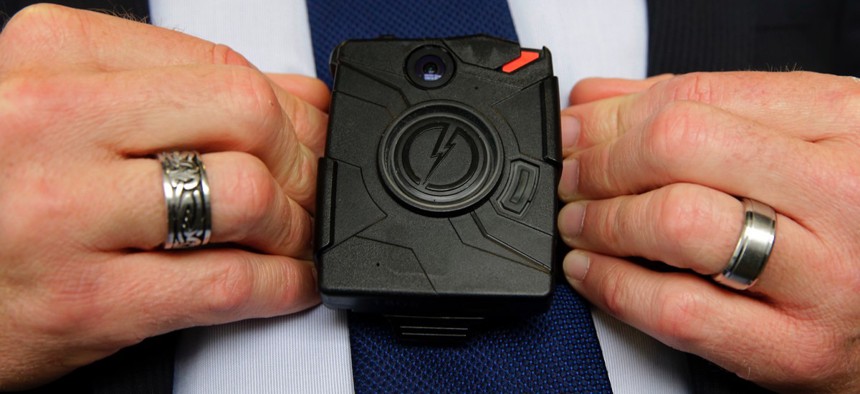Police Departments Are at a Digital Training Crossroads

Steve Tuttle, vice president of communications for Taser International, demonstrates one of the company's body cameras during a company-sponsored conference at the California Highway Patrol headquarters in Sacramento. Rich Pedroncelli / AP Photo

Connecting state and local government leaders
Many departments appear to have already embraced artificial intelligence, but their personnel require new skills to make the most of the disruptive technology, a new report says.
Nearly two-thirds of law enforcement personnel reported their agencies use artificial intelligence to some degree for administrative, forensics or social media risk analysis work, according to an Accenture survey released Monday at the International Association of Chiefs of Police conference in Orlando, Florida.
The Dublin, Ireland-based consulting company surveyed 309 employees from policing organizations across six countries, including the U.S., and found 76 percent expected to need new digital skills within five years.
Half indicated they were open to the necessary training, if offered by their employers.
“Now is the time where police executives need to focus on what they need for the future,” said Jody Weis, former Chicago Police Department superintendent and a public safety lead at Accenture. “People are going to have to be more technically savvy.”
Weis described a “healthy skepticism” he sees among law enforcement officials regarding innovations, but said the mindset that departments have gotten by without disruptive technology in the past needs to change.
About 40 percent of respondents said current workforce planning and recruitment policies are ineffective, while 72 percent said it’s difficult to reskill employees to handle digital tasks.
And yet tech is helping police identify suspects faster and perform their jobs safer.
“Body cameras are really going to be the drivers that force departments to start asking: How can we do our jobs better?” Weis said.
The devices were the No. 1 tech advancement employees expected their agencies to adopt within three to five years, followed by biometrics and predictive analytics.
Departments were initially overwhelmed by the sheer volume of information supplied by body cameras, Weis said, but as more move that data into the cloud, they’re beginning to exploring its applications.
Critical information about a suspect may have been ingested by a body camera without an officer’s knowledge during interviews, which is critical in the first hour of a child abduction case. Video analytics software can pick up on such information and alert investigators, Weis said.
With more body cameras have come more public records requests seeking access to their footage, and tech can also help automate frame-by-frame redactions of nonessential details to protect people’s privacy.
The areas police employees expect to be most enhanced by tech include the targeting of gangs and criminal networks, emergency response and investigations. For this reason, departments need to foster a diversity of skill sets among their personnel to handle different situations, Weis said.
Dave Nyczepir is a News Editor at Government Executive’s Route Fifty and is based in Washington, D.C.

NEXT STORY: Rating LGBTQ Equality in American Cities





